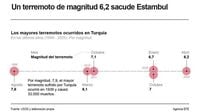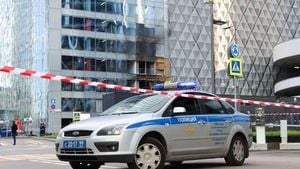A strong earthquake of magnitude 6.2 shook Istanbul on April 23, 2025, causing widespread panic among the city's residents but fortunately resulting in no fatalities. The tremor, which struck at 12:49 PM local time (9:49 GMT), had its epicenter in the Sea of Marmara, approximately 40 kilometers southwest of Istanbul, at a depth of 6.9 kilometers, as reported by the Turkish Disaster and Emergency Management Authority (AFAD).
According to reports, around 236 individuals were injured, primarily from panic-induced reactions such as jumping from buildings or suffering panic attacks. The Governor of Istanbul, Davut Gül, stated, "The earthquake did not cause any fatalities. About 151 citizens are being treated in hospitals after jumping from high places, but none are at risk of life." Most of the injuries occurred in Istanbul, where residents were already on edge due to the city's historical vulnerability to earthquakes.
In the aftermath, the authorities received over 378 reports of structural damage to buildings. However, apart from one abandoned structure that collapsed in the historic Fatih district, no significant destruction was reported. The Minister of Interior, Ali Yerlikaya, confirmed that the earthquake lasted only 13 seconds and was followed by more than 100 aftershocks, with the strongest measuring 5.9.
As a precaution, 12 buildings were evacuated, and officials urged residents to avoid entering any structures that may have been compromised. Many people sought refuge in parks and open areas to distance themselves from potentially unstable buildings. The Minister of Education, Yusuf Tekin, announced that schools in Istanbul would remain closed for two days, allowing students to stay safe while schoolyards were opened for public use.
The earthquake was felt not only in Istanbul but also in neighboring provinces such as Tekirdag, Yalova, Bursa, and Balikesir, as well as in Izmir, located about 550 kilometers south of Istanbul. The tremor triggered a wave of panic, especially among children who were outside celebrating National Sovereignty and Children's Day, a national holiday in Turkey.
Many residents fled their homes, some recounting their experiences as they sought safety. Leyla Ucar, a personal trainer, described how she was exercising on the 20th floor of a building when the quake hit. "We were shaken incredibly. It threw us from side to side; we couldn’t understand what was happening. We didn’t think it was an earthquake at first due to the impact of the event," she shared.
In the wake of the earthquake, the Turkish government activated the National Disaster Response Plan (TAMP) to facilitate aid and recovery efforts. President Recep Tayyip Erdogan addressed the nation, expressing relief that there appeared to be no significant problems. "Thank God, there seems to be no issues for now," he stated during a commemorative event for National Sovereignty and Children's Day.
Despite the immediate aftermath showing no severe damage, experts warn that Istanbul remains at high risk for future seismic events. Approximately 600,000 buildings in the city are at immediate risk of collapse in the event of a stronger earthquake, according to the Ministry of Environment, Urbanization, and Climate Change. This vulnerability is compounded by the fact that an estimated 1.5 million buildings in Istanbul do not meet current seismic standards, representing around 70% of the city's total structures.
With a population exceeding 16 million, Istanbul is one of Europe’s largest cities and is situated near the North Anatolian Fault, a major geological fault line that has historically been the source of significant seismic activity. Experts have long predicted that a major earthquake is inevitable, although the timing remains uncertain. This latest tremor has reignited fears among residents who are still recovering from the devastating earthquakes that struck southeastern Turkey in early 2023, which resulted in over 53,000 deaths and left countless buildings damaged or destroyed.
As the city grapples with the aftermath of the quake, many residents are left questioning their safety and the readiness of their homes to withstand future seismic events. Some, like Cihan Boztepe, who fled with his family to safety, expressed their ongoing concerns. "Our worries continue," he said, reflecting a sentiment shared by many in the city.
In response to these concerns, both national and local governments have initiated urban renewal projects aimed at reinforcing buildings deemed at risk and have launched campaigns to demolish structures that do not meet safety standards. However, the recent political climate, including the arrest of Istanbul's mayor on corruption charges, has complicated the city's governance and its ability to address these pressing issues effectively.
As Istanbul continues to recover from this latest earthquake, the focus remains on ensuring the safety of its residents and preparing for the inevitable challenges posed by its geological reality. The importance of proactive measures in disaster preparedness and response cannot be overstated, as the city faces the dual challenges of a growing population and aging infrastructure.





